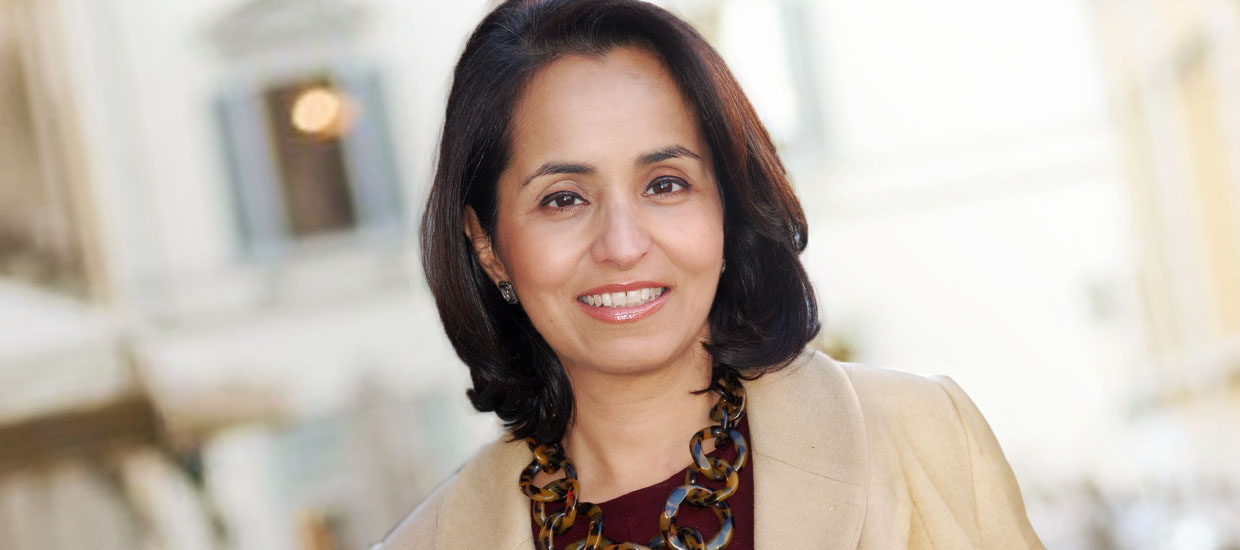Gulnar Vaswani, B.B.A. ’91, M.B.A. ’93, is sitting on a lounger in the lobby café at the Mandarin Oriental on Brickell Key. The waitress has just brought Gulnar her cappuccino, but to Gulnar’s disappointment, it’s lukewarm.
She explains to us that she understands why many Miami establishments serve ‘cooler’ hot coffee – the tropical climate doesn’t exactly welcome searing hot beverages. But Gulnar sees this experience as an opportunity to demonstrate what she does for a living. In receiving a cappuccino below her expectation, she has consciously chosen to consider why it arrived that way, instead of jumping to the conclusion that the waitress or kitchen staff are slacking or inept (a reaction all too common).
“I built a bridge. I took down the wall that would have barred me from taking geographic location and cultural norms into consideration, and gave the staff the benefit of doubt that had they known I wanted a very hot coffee, they would have delivered.”
Gulnar speaks with a candid absolution. She neither judges what she sees first, nor makes assumptions of others, especially those of different cultures. In her eyes, everything seems like a possibility and everyone capable.
“Inclusion is active,” she says, while sipping on her cappuccino. “I help leaders understand and embrace inclusiveness, cross-cultural dynamics and diversity.” Gulnar’s clients come from a range of business sectors, including Fortune 500 companies looking to gain a better perspective in a new country, as well as the Young President’s Organization. She also works with non-governmental organizations and academic institutions, and speaks at regional and global diversity conferences.
“The underlying intention of my work is to connect people and build on similarities rather than focus on differences,” she says, before quoting Sir Isaac Newton’s famous line, “We build too many walls and not enough bridges.”
Gulnar travels throughout Asia and to the US quite often, mostly for work, but also because her son just started university in California and her mom continues to live in Miami. Her family played a majority of the justification she needed to leave the world of finance. “Being good at something doesn’t mean that is your purpose,” she says about her previous career. And since finance did not allow her the flexibility to be what she wanted to be, namely a hands-on mom, she took a leap of faith and left the safety and comfort of her corporate career.
“I wanted to do something that was important to me and that could create an impact,” she says. Now more than ever, companies are expanding their awareness of workplace inclusivity, especially because retention innovation and engagement are big measures in this century.
So she travels from company to company, carrying out “gentle audits,” as she calls them, to make organizations take a deeper look at where they are today, and how business gets done. She forces management and leaders to ask themselves, ‘are we fully and truly inclusive? Are we indicative of the hemispheric values that we preach?’ After all, how can companies mobilize and relocate new employees, and expect them to perform at their native level without addressing culture shock?
In Asia, her works comes from companies hiring US- or European-based employees and relocating them to the local markets. That type of culture shock, for both the employee and his or her family if they relocate too, is deafening. They’re not only expected to perform the job, but they need to communicate as well, and not just by spoken or written language, but also by cultural means of communication. They might not be familiar with the intricate nuances of how business is done in X country, much less the complexities of learning and actively engaging in new working relationships with colleagues. Likewise, managers need to be taught how to be open and understanding to these realities of the recruits they’ve just brought on board.
“I help bridge the East to the West,” she says. “My work helps to demystify the differences in cultures so that everyone can work as cohesively as possible.” Gulnar also supports multinational corporations develop their Asian talent and believes that it is imperative to adopt a culturally appropriate lens in talent development.
After a decade of working for Your Best Forward, a company which she founded, she is venturing in a rebrand, and her business will be known simply as Gulnar Vaswani. She’ll continue to advise, coach, train and speak at diversity conferences, whilst juggling her household and parental responsibilities.
She’s grateful for her education from the University of Miami, and credits her parents for encouraging higher education. As the daughter of economic immigrants from Bombay (modern day Mumbai) Gulnar’s parents forged education as non-negotiable in their household. “It was a way for my parents to equalize the playing field,” she says.
“My dad believed in me, and believed that I could achieve the American dream. And I quickly learned that inclusion, by definition, is an environment where anybody, regardless of race or religion, can succeed if they have the ability to do so. Inclusiveness is the secret behind the American dream.”
Inclusion is the very thing that makes a person, an institution, even a country successful.





